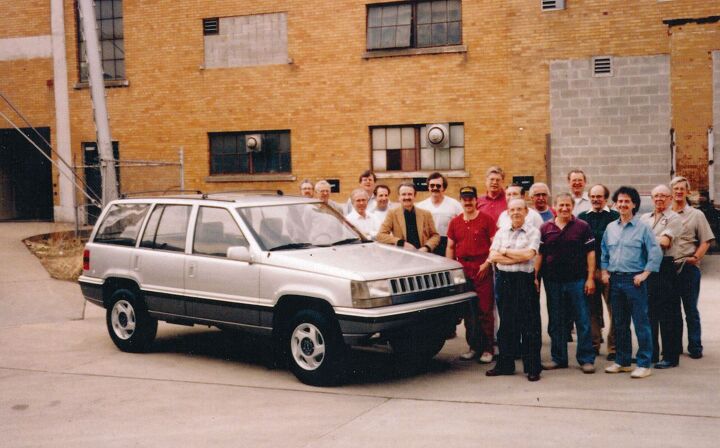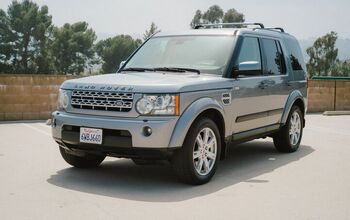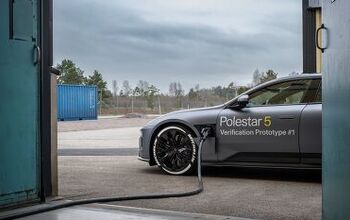Documentary Series The Last Independent Automaker in Production, Will Chronicle the Life and Times of American Motors Corporation

A new documentary is currently in production and promises to be of interest to many of our readership. It’s about everyone’s favorite underdog automaker, American Motors Corporation (1954-1988)! Pride of Kenosha, Wisconsin. The team behind the production of The Last Independent Automaker is assembling a deep dive into the brand’s history, which started in 1954 when car and refrigerator manufacturer Nash-Kelvinator Corporation acquired Hudson Motor Car Company, and formed AMC.
The newly-formed American Motors Corporation initially found its niche in small and fuel-efficient vehicles, chasing a corner of the market that was almost completely ignored by The Big Three and their large, thirsty vehicles. Think of the Metropolitan, one of the first American subcompact economy cars.
AMC continued to innovate throughout its history, while it simultaneously struggled to compete via a much smaller budget than its domestic competition. The cars AMC produced in the Eighties were largely reworks of their products from the Sixties, with new styling and new names. The fancy Eighties Concord was a Hornet underneath, a compact that entered production in 1969 for the ’70 model year.
Eventually, AMC would fall under Renault’s control and invest in the development of vehicles like the very successful ZJ Jeep Cherokee, and the very unsuccessful Eagle Premier. The latter of which cost a lot of money, and was sourced primarily from then-owner Renault.
All very interesting stuff. The Last Independent Automaker promises to cover AMC not only from a general historical perspective, but also through the lens of the people who worked in Kenosha, Detroit, and Toledo for AMC. From the women who braved the rampant sexism of an American auto plant in the Fifties to those who had white-collar positions at the company’s offices, and the various discrimination issues that were so prevalent for so long.
The series will also focus on the economics of AMC – relevant for a company that continually struggled with its finances, and had to design and build its vehicles on a tight budget. Despite its money problems, AMC was known as an innovative automaker and made impressive advancements in unibody manufacturing, four-wheel-drive in passenger cars (gasp!), and air conditioning technology for automobiles.
Fuel economy remained a consistent focus at AMC, and the company’s engineers made strides toward better fuel economy and cleaner emissions at a time when it wasn’t de rigueur to do so. Such a focus on economy and emissions was helpful to AMC when events like the oil shortage of ’73 sent gasoline prices through the roof and meant consumers were desperate for more efficient cars. AMC was ready with the most unconventional Pacer for compact economy car duty. And that went well.
The series will also take a look a the role the government played in major new safety standard mandates, which affected all automakers to a great extent during the Seventies. Engineering around the requirements on a limited budget (and often with dated platforms) meant AMC’s employees had a slightly more difficult task than other Detroit automakers.
Though still in production, the people behind The Last Independent Automaker have scoured the AMC archives from every possible direction and secured about 100 hours of footage via the archives at the Kenosha History Center, as well as 20,000 historical pictures. Interviews with more than 25 AMC employees are presently being conducted, and the production has already recorded over 30 hours of material. Notable interviewees include two CEOs from AMC, MotorWeek legend John Davis, longtime AMC designer Vince Geraci, and Mitt Romney. Romney’s father George was the CEO of AMC from 1954 to 1962 and was responsible for the implementation of a new idea: A profit-sharing agreement with employees.
Broken up into six half-hour segments, the series is set to air in the spring of 2024 and cover the entire history of AMC. Episodes will be segmented by time period. The production team has already secured a distribution agreement with Maryland Public Television (which also produces MotorWeek) which will conduct the marketing and send all six parts out to PBS stations. The series will also be available for streaming online upon release.
The trailer for The Last Independent Automaker trailer is above, and more information is also available on their website.
[Images: The Last Independent Automaker]

Interested in lots of cars and their various historical contexts. Started writing articles for TTAC in late 2016, when my first posts were QOTDs. From there I started a few new series like Rare Rides, Buy/Drive/Burn, Abandoned History, and most recently Rare Rides Icons. Operating from a home base in Cincinnati, Ohio, a relative auto journalist dead zone. Many of my articles are prompted by something I'll see on social media that sparks my interest and causes me to research. Finding articles and information from the early days of the internet and beyond that covers the little details lost to time: trim packages, color and wheel choices, interior fabrics. Beyond those, I'm fascinated by automotive industry experiments, both failures and successes. Lately I've taken an interest in AI, and generating "what if" type images for car models long dead. Reincarnating a modern Toyota Paseo, Lincoln Mark IX, or Isuzu Trooper through a text prompt is fun. Fun to post them on Twitter too, and watch people overreact. To that end, the social media I use most is Twitter, @CoreyLewis86. I also contribute pieces for Forbes Wheels and Forbes Home.
More by Corey Lewis
Latest Car Reviews
Read moreLatest Product Reviews
Read moreRecent Comments
- ChristianWimmer 2018 Mercedes A250 AMG Line (W177) - no issues or unscheduled dealer visits. Regular maintenance at the dealer once a year costs between 400,- Euros (standard service) to 1200,- Euros (major service, new spark plugs, brake pads + TÜV). Had one recall where they had to fix an A/C hose which might become loose. Great car and fun to drive and very economical but also fast. Recently gave it an “Italian tune up” on the Autobahn.
- Bd2 Lexus is just a higher trim package Toyota. ^^
- Tassos ONLY consider CIvics or Corollas, in their segment. NO DAMNED Hyundais, Kias, Nissans or esp Mitsus. Not even a Pretend-BMW Mazda. They may look cute but they SUCK.I always recommend Corollas to friends of mine who are not auto enthusiasts, even tho I never owed one, and owned a Civic Hatch 5 speed 1992 for 25 years. MANY follow my advice and are VERY happy. ALmost all are women.friends who believe they are auto enthusiasts would not listen to me anyway, and would never buy a Toyota. They are damned fools, on both counts.
- Tassos since Oct 2016 I drive a 2007 E320 Bluetec and since April 2017 also a 2008 E320 Bluetec.Now I am in my summer palace deep in the Eurozone until end October and drive the 2008.Changing the considerable oils (10 quarts synthetic) twice cost me 80 and 70 euros. Same changes in the US on the 2007 cost me $219 at the dealers and $120 at Firestone.Changing the air filter cost 30 Euros, with labor, and there are two such filters (engine and cabin), and changing the fuel filter only 50 euros, while in the US they asked for... $400. You can safely bet I declined and told them what to do with their gold-plated filter. And when I changed it in Europe, I looked at the old one and it was clean as a whistle.A set of Continentals tires, installed etc, 300 EurosI can't remember anything else for the 2008. For the 2007, a brand new set of manual rec'd tires at Discount Tire with free rotations for life used up the $500 allowance the dealer gave me when I bought it (tires only had 5000 miles left on them then)So, as you can see, I spent less than even if I owned a Lexus instead, and probably less than all these poor devils here that brag about their alleged low cost Datsun-Mitsus and Hyundai-Kias.And that's THETRUTHABOUTCARS. My Cars,
- NJRide These are the Q1 Luxury division salesAudi 44,226Acura 30,373BMW 84,475Genesis 14,777Mercedes 66,000Lexus 78,471Infiniti 13,904Volvo 30,000*Tesla (maybe not luxury but relevant): 125,000?Lincoln 24,894Cadillac 35,451So Cadillac is now stuck as a second-tier player with names like Volvo. Even German 3rd wheel Audi is outselling them. Where to gain sales?Surprisingly a decline of Tesla could boost Cadillac EVs. Tesla sort of is now in the old Buick-Mercury upper middle of the market. If lets say the market stays the same, but another 15-20% leave Tesla I could see some going for a Caddy EV or hybrid, but is the division ready to meet them?In terms of the mainstream luxury brands, Lexus is probably a better benchmark than BMW. Lexus is basically doing a modern interpretation of what Cadillac/upscale Olds/Buick used to completely dominate. But Lexus' only downfall is the lack of emotion, something Cadillac at least used to be good at. The Escalade still has far more styling and brand ID than most of Lexus. So match Lexus' quality but out-do them on comfort and styling. Yes a lot of Lexus buyers may be Toyota or import loyal but there are a lot who are former GM buyers who would "come home" for a better product.In fact, that by and large is the Big 3's problem. In the 80s and 90s they would try to win back "import intenders" and this at least slowed the market share erosion. I feel like around 2000 they gave this up and resorted to a ton of gimmicks before the bankruptcies. So they have dropped from 66% to 37% of the market in a quarter century. Sure they have scaled down their presence and for the last 14 years preserved profit. But in the largest, most prosperous market in the world they are not leading. I mean who would think the Koreans could take almost 10% of the market? But they did because they built and structured products people wanted. (I also think the excess reliance on overseas assembly by the Big 3 hurts them vs more import brands building in US). But the domestics should really be at 60% of their home market and the fact that they are not speaks volumes. Cadillac should not be losing 2-1 to Lexus and BMW.







































Comments
Join the conversation
I guess former CEO Gerald Meyers is one of the former AMC bosses who was interviewed. I hope they ask him if he regrets the buy in from Renault. AMC-Renault was a disaster and the final deathblow to AMC's survival.
My Dad was an AMC guy when I was growing up. A New one every 2 years, his friend had a Dealership 3 hours away, in my Dad's Home Town.
Ambassadors, then a used Gremlin (2nd Car) then a Matador, when Ambassadors were discontinued, and finally a Pacer X. Then his friend started selling GM's.
My Dad would say "The Best Car I ever owned" was the first Monte Carlo he purchased after the long string of AMC's